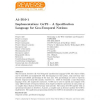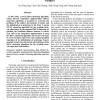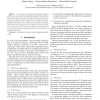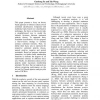203 search results - page 20 / 41 » On interval fuzzy negations |
KI
2006
Springer
13 years 10 months ago
2006
Springer
This document describes the `Geo-Temporal' specification language GeTS. The objects which can be described and manipulated with this language are time points, crisp and fuzzy...
ESWA
2010
13 years 7 months ago
2010
1 In this study, a novel robust clustering algorithm, robust interval competitive agglomeration (RICA) clustering algorithm, is proposed to overcome the problems of the outliers, t...
IAT
2008
IEEE
14 years 4 months ago
2008
IEEE
In this work we introduce the first steps towards the definition of an answer set semantics for residuated logic programs with negation.
EUSFLAT
2009
13 years 7 months ago
2009
In this paper we present the operational semantics of RFuzzy, a fuzzy Logic Programming framework that represents thruth values using real numbers from the unit interval. RFuzzy pr...
COLING
2010
13 years 5 months ago
2010
This paper presents a fuzzy set theory based approach to Chinese sentence-level sentiment classification. Compared with traditional topic-based text classification techniques, the...




